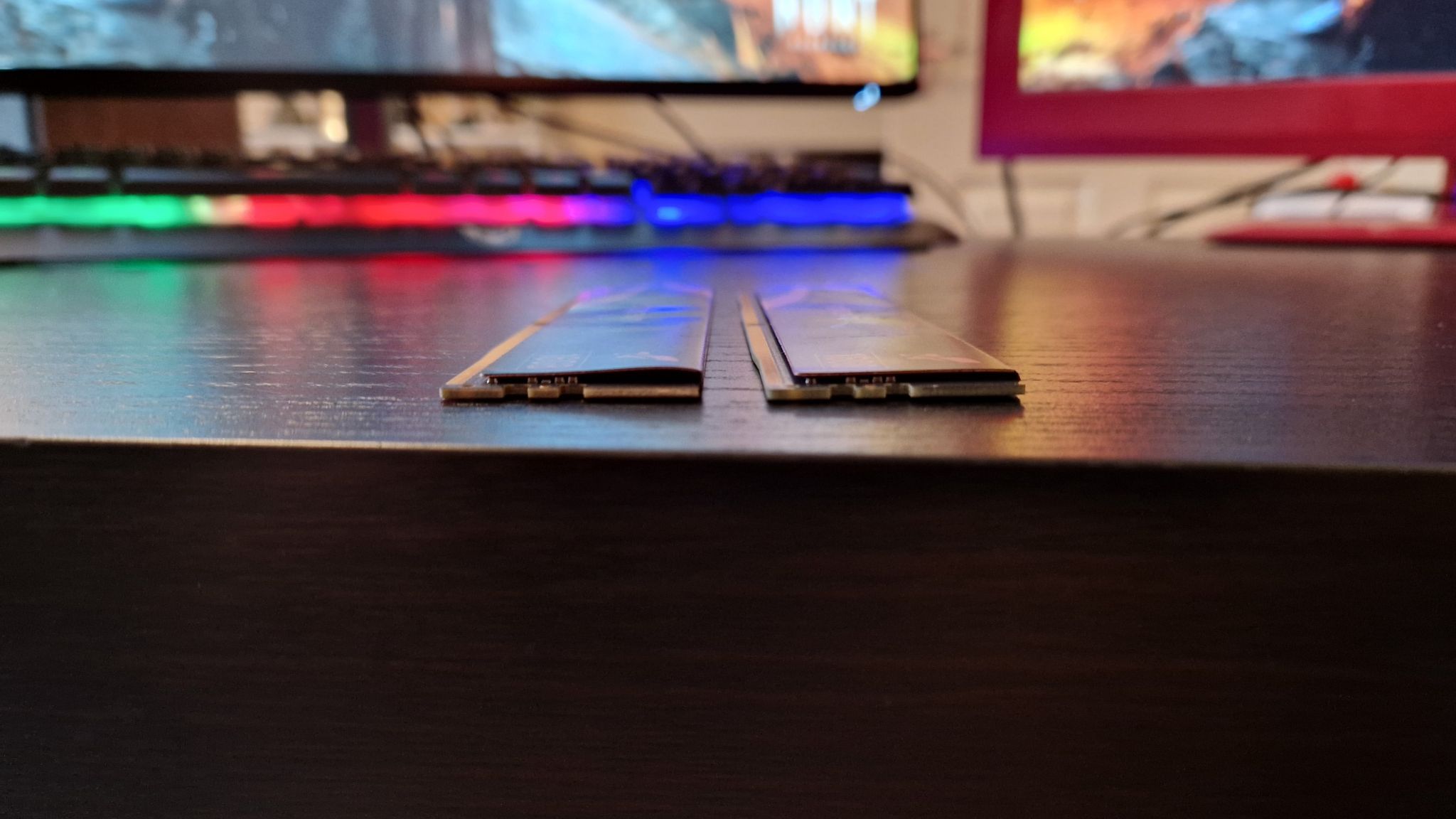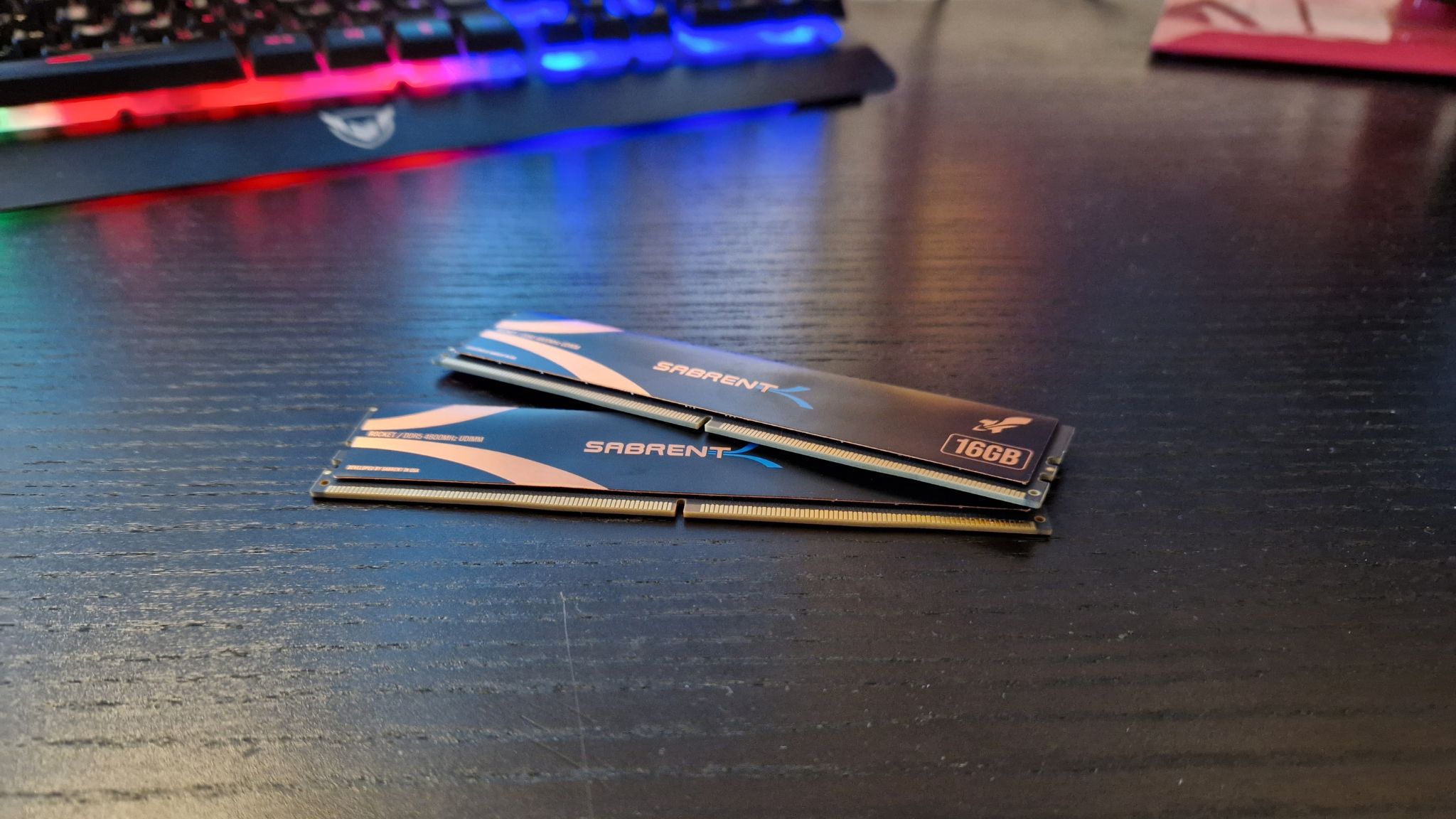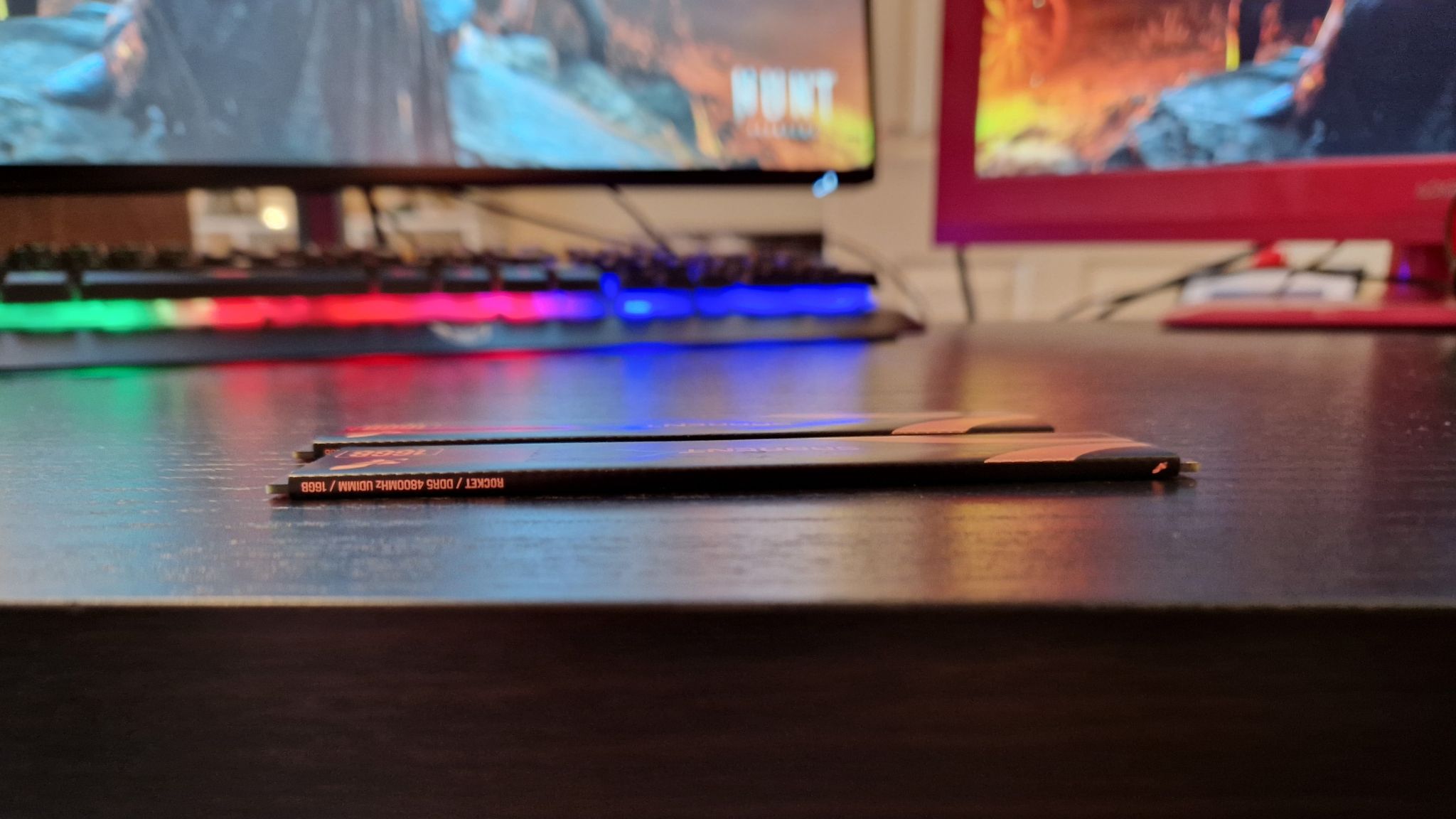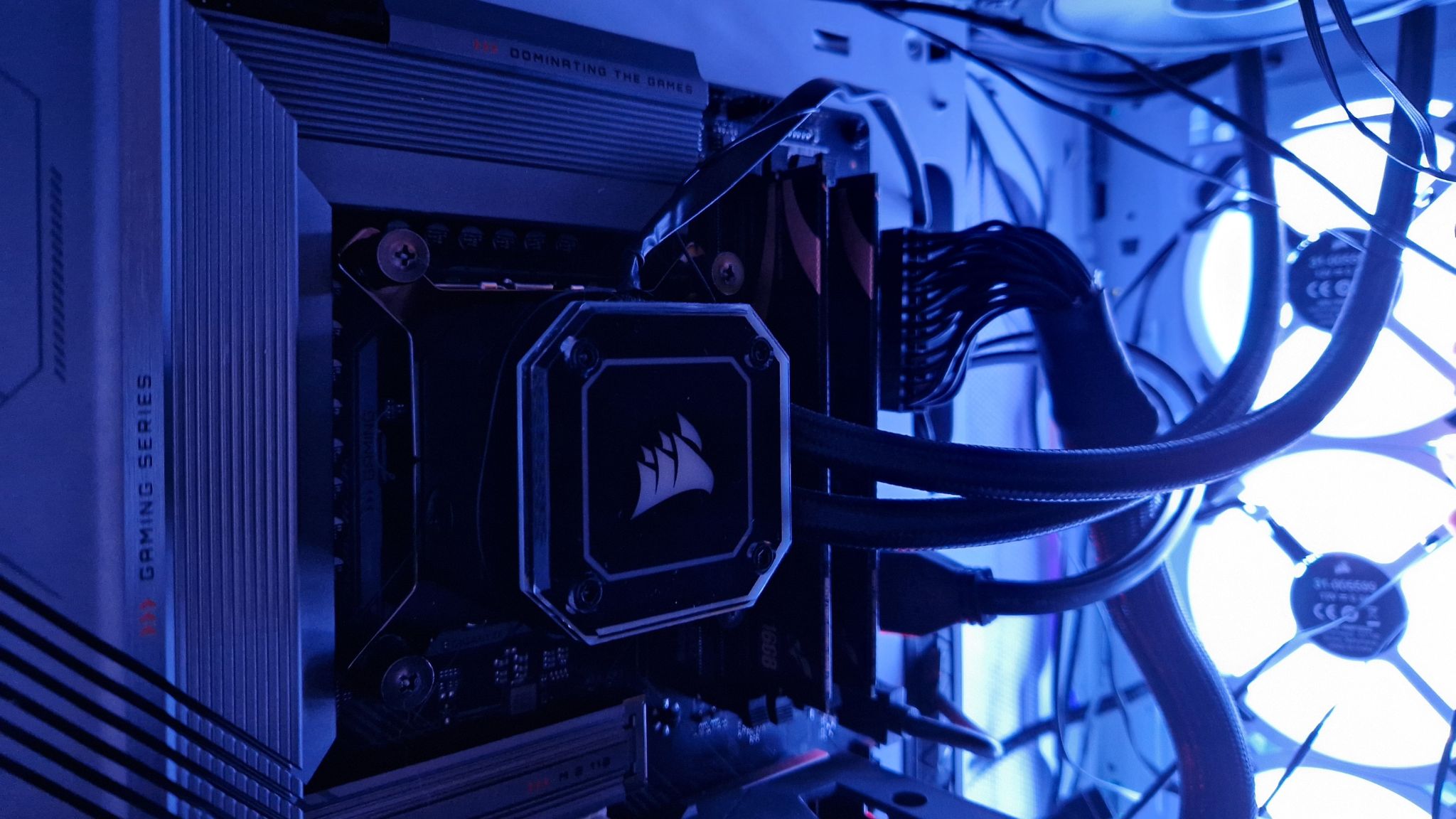Pros
- +
Great clock speeds
- +
XMP noticeably boosts performance
- +
Competitively priced
- +
Minimalist design
Cons
- -
So thin it feels a bit fragile
- -
Minimalist design (again)
Great clock speeds
XMP noticeably boosts performance
Competitively priced
Minimalist design
So thin it feels a bit fragile
Minimalist design (again)
Why you can trust GamesRadar+ Our experts review games, movies and tech over countless hours, so you can choose the best for you. 澳洲幸运5开奖号码历史查询:Find out more a🍸bout our reviews policy.
As DDR5 continues to creep its way into more and more of the 澳洲幸运5开奖号码历史查询:best gaming PCs, it's refreshing to see products like Sabrent's Rocket DDR5 hitting the shelves. Sabrent, known best for its storage products, has continued its streak of quality with Rocket DDR5 RAM modules that come in 16GB and 32GB models. With a quoted clock speed of 4800MHz, it doesn't quite have the ridiculous speeds of the absolute 澳洲幸运5开奖号码历史查询:best RAM for gaming. The Corsair Dominator Platinum has 6000MHz out of the box, for exa🌠mple. But the Rocket DDR5 does match up well with Corsair's Vengeance DDR5, and is competitively priced to do so.
At $179.99 / £145 (for 16GB), it🍎's still fairly pricey next to DDR4 options. Is the extra efficiency of this new generation worth the money in Sabrent's latest bit of rocket science?
As you'll see from the images below, Sabrent's Rocket DDR5 RAM sticks are tiny. I don't want to body shame other DDR5 modules, but these may well be the thinnest high-performance RAM sticks I've ever seen, especially when you look at the flashy DDR5 options on our best RAM list. There aren't loud RGB lights to shout about here or even an outspoken passi♚ve heatsink. In that case, thi💛s is a perfect choice if you're looking for minimalism.

Honestly, it's hard to nail down whether this very slight design is a pro or a con. Tiny as it is, there is an absolutely ingenious copper heat spreader on the outside of the stick that keeps the circuitry nice and cool. On the other hand, I couldn't help but feel there was some fragility when I was installing it into our testing rig, especially given the price. It feels 🐟like holding an elongated ritz cracker that would be all too easily snapped in twain if you apply pressure at the wrong angle. Regardless, this type of design work in such a powerful memory kit should be applauded.
In terms of features, Sabrent has designed these modules with overclocking in mind, which, for DDR5, is saying something. Although the marketed speed is 4800MHz, Sabrent says these sticks are supposedly capable of up to four༺ times the module capacity with DRAM. So it's very possible to get upwards of 5000MHz, should you need it. We'll talk more about performance in a second, but these overclocking speeds are said to be possible thanks to some clever architecture. Sabrent says it split the normal 64-bit channel found in most DDR5 modules into two independent 32-bit channels.
Finally, if you're looking for a memory upgrade for one of the 澳洲幸运5开奖号码历史查询:best gaming laptops, the Sabrent Rocket DDR5 comes in smaller form factors too, so you can slot a module into ♛one of those as well.

If you aren't familiar with RAM upgrades, allow me to explain. Even though you might buy certain RAM sticks because of the speeds they quote on the box, when you first install them they will almost always run at much lower speed♛s. In order to access the fast paces you pay for, you need to head into your BIOS and have a quick footer about with your settings. Luckily, XMP profiles, or Xtreme Memory Profiles, help you to access more performance without manually overclocking every setting, and that's exactly what I did with Sabrent's Rocket DDR5 to put it through its paces.
Out of the box, our testing rig was running the RAM at about 4200MHz, which, for a lot of people, is still extremely quick. We were very impressed with 澳洲幸运5开奖号码历史查询:PNY's XLR8 Gaming DDR4, for example🎀, and its speeds 🌞are quoted around the 3600MHz mark.
For reference, our testing rig has a 12th Gen Intel Core 🎉i7-12700K CPU. After plenty of use at this DRAM rate, I played around with some XMP profiles to give the RAM a push. After doing so, I got theไ quoted speed of 4800MHz, and later on, even pushed it to 5000MHz. That's about as brave as I got, but considering that Sabrent says the modules are capable of four times the module capacity, I'd be willing to bet that the Rocket DDR5 sticks are highly futureproofed.

After enabling XMP, I found that there was a noticeable difference in load times in the three games I used for testing. Our testing rig's PNY SSD, which is up there with the 澳洲幸运5开奖号码历史查询:best SSDs for gaming, is great at the best of times, but the RAM boost definitely felt as though it꧋ made its life easi💛er.
There are plenty of folks that will still tell you RAM won't have a bearing on frame rates - it certainly isn't the go-to benchmark💫ing method for memory. On the other hand, I think that can be a real tell for memory that's going to take strain off your other components. After some testing, it was clear to me that this RAM's overclocking capabilities will do just that.
As you can see from the table below, I played three games with varying technical demands at both 1080p and 1440p, with medium settings, and logged some fps rates. I then enabled XMP in the BIOS and played them again to see if there was any change. I thought this would be a decent way to test the Rocket DDR5 because even with an RTX 3050 GPU that isn't the🤡 beefiest, I wanted to see if the XMP clock speeds would make its life a little easier.
You can see the results in the table below.
| Row 0 - Cell 0 | 1080p | 1080p XMP Enabled | 1440p | 1440p XMP Enabled |
| Hunt: Showdown | 100 fps | 110 fps | 85 fps | 90 fps |
| Apex Legends | 130 fps | 144 fps | 90 fps | 124 fps |
| Metro Exodus | 135 fps | 151 fps | 60 fps | 100 fps |
I was very pleasantly surprised by the results of this test. As you can see, the fine-tuned speeds gave these games a considerable boost in performance, particularly when the RTX 3050 was trying to run games at 1440p. From this test alone, I can def𝓡initely recommend the Rocket DDR5 modules. They're perfect for anyone who wants to squeeze every last drop of power out of their PC components without overclocking everything and screaming "I'm giving her all she's got, captain!"

While I wa♔sn't brave enough to push past 5000MHz, I'd def🍒initely believe that Sabrent's Rocket DDR5 is more than capable of doing so. What you have here then, is a RAM kit that has marketed "second class" DDR5 speeds, but can definitely keep up with pricier, top-of-the-line options. The intuitive and minimalist design might not be for everyone, but this has to be one of the purest top performers on the market, especially when it comes to its overclocking capabilities.
For its pric꧑e, I'd pr♛efer it if it didn't feel quite as fragile, but the performance boost this RAM gave to our testing PC was substantial. For that reason, this is an easy recommendation from me.
Sabrent's Rocket DDR5 RAM was our testing PCs short-term memory for the past two or so months. We used two 16GB sticks to give ou༺rselve𓃲s 32GB in total. I've had lots of experience with the Rocket DDR5 in that time, both in terms of general PC use and when playing games.
I focused on XMP profiles and BIOS settings, as well as CPUZ to track the RAM's possible MHz speeds. I also watched voltages when playing with these settings to ensure safety while boosting, although the RAM always seemed totally at ease when pushed. While I didn't track read and write speeds, or do any overly technical Passmark benchmarking, I pre💟ferred to test in ways that the average gamer, first-time buyer, or inexperienced PC builder would understand and appreciate.
As mentioned, I kept an eye on load times and frame rates during use. After over a month of using the RAM at its out-of-the-box speed before enabling XMP, I noticed a substan𒐪tial increase in load times and fps rates in various games.
You can read more on how we test gaming tech in our full 澳洲幸运5开奖号码历史查询:GamesRadar+ Hardware Policy.
Not quite ready for DDR5 yet? You could always put the money toward one of the 澳洲幸运5开奖号码历史查询:best SSDs for gaming, or one of the 澳洲幸运5开奖号码历史查询:best CPUs for gaming instead.